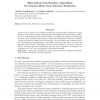Free Online Productivity Tools
i2Speak
i2Symbol
i2OCR
iTex2Img
iWeb2Print
iWeb2Shot
i2Type
iPdf2Split
iPdf2Merge
i2Bopomofo
i2Arabic
i2Style
i2Image
i2PDF
iLatex2Rtf
Sci2ools
JMLR
2010
2010
Hierarchical Cost-Sensitive Algorithms for Genome-Wide Gene Function Prediction
In this work we propose new ensemble methods for the hierarchical classification of gene functions. Our methods exploit the hierarchical relationships between the classes in different ways: each ensemble node is trained "locally", according to its position in the hierarchy; moreover, in the evaluation phase the set of predicted annotations is built so to minimize a global loss function defined over the hierarchy. We also address the problem of sparsity of annotations by introducing a cost-sensitive parameter that allows to control the precision-recall trade-off. Experiments with the model organism S. cerevisiae, using the FunCat taxonomy and seven biomolecular data sets, reveal a significant advantage of our techniques over "flat" and cost-insensitive hierarchical ensembles.
| Added | 19 May 2011 |
| Updated | 19 May 2011 |
| Type | Journal |
| Year | 2010 |
| Where | JMLR |
| Authors | Nicolò Cesa-Bianchi, Giorgio Valentini |
Comments (0)

